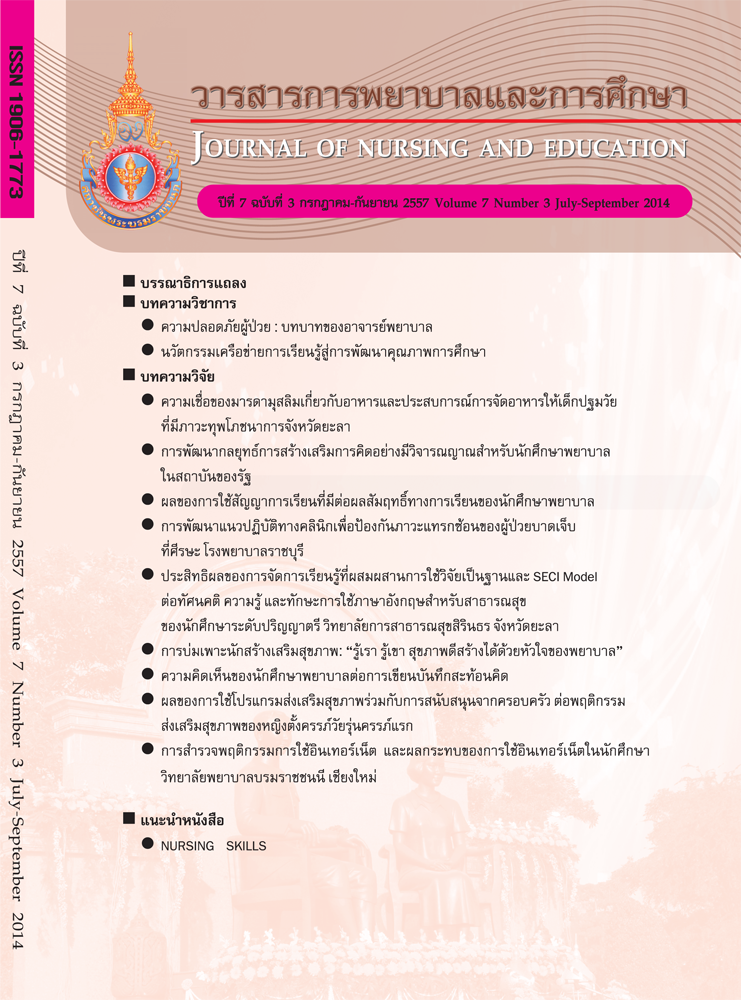ความเชื่อของมารดามุสลิมเกี่ยวกับอาหารและประสบการณ์ การจัดอาหารให้เด็กปฐมวัยที่มีภาวะทุพโภชนาการจังหวัดยะลา
คำสำคัญ:
beliefs about foods, Muslim mothers, food preparation experiences, childhood period, malnutritionบทคัดย่อ
บทคัดย่อ
การวิจัยนี้มีวัตถุประสงค์เพื่อศึกษาความเชื่อของมารดามุสลิมเกี่ยวกับอาหารและประสบการณ์
การจัดอาหารให้เด็กปฐมวัยที่มีภาวะทุพโภชนาการจังหวัดยะลา ใช้วิธีการวิจัยเชิงพรรณนา เก็บรวบรวมข้อมูลโดยวิธีการเชิงคุณภาพ (Qualitative Method) เลือกกลุ่มตัวอย่างแบบเจาะจงตามคุณสมบัติที่กำหนดคือ เป็นมารดาที่นับถือศาสนาอิสลามโดยกำเนิด บุตรมีภาวะทุพโภชนาการ มีประสบการณ์การจัดอาหารให้กับบุตรของตนเอง ยินดีให้ข้อมูลที่เกี่ยวข้องกับการวิจัยจนกระทั่งจบกระบวนการวิจัย ได้ผู้ให้ข้อมูลหลัก จำนวน 11 คน การเก็บรวบรวมข้อมูลโดยการสัมภาษณ์แบบเจาะลึก (In-depth Interview) เครื่องมือที่ใช้เป็นแบบสัมภาษณ์กึ่งโครงสร้าง วิเคราะห์ข้อมูลโดยการวิเคราะห์เนื้อหา (Content Analysis) ผลการวิจัย แสดงให้เห็นว่า มารดาทุกคนมีความเชื่อเรื่อง อาหารให้บุตรโดยเลือกเฉพาะอาหารฮาลาลตามหลักการของศาสนา
อิสลามเท่านั้น ส่วนเรื่อประเภทของอาหาร มีมารดาผู้ให้ข้อมูลหลักจำนวน 6 คนจาก 11 คน คิดเป็นร้อยละ 54.54 ที่เชื่อว่ายังไม่สามารถให้บุตรรับประทานปลาได้หากยังไม่สามารถพูดคำว่าปลาได้ด้วยเหตุผลว่าเกรงจะเป็นโรค แต่ก็ยังปรากฏข้อมูลว่ามารดาบางคนไม่ทราบเหตุผลแต่ปฏิบัติตามที่ผู้ใหญ่บอกมา และผู้ให้ข้อมูลหลักจำนวน 5 คน คิดเป็นร้อยละ 45.45 ที่ระบุว่าจะไม่ให้บุตรรับประทานของเย็นทุกประเภทเมื่อเจ็บป่วย ด้านประสบการณ์การจัดอาหารให้กับบุตรปฐมวัย มารดาผู้ให้ข้อมูลหลักทุกคนไม่มีการจัดอาหารให้กับบุตรปฐมวัยโดยเฉพาะ ให้รับประทานอาหารตามที่บุคคลในครอบครัวรับประทาน บางครอบครัวให้บุตรรับประทานอาหารรสจัด อาหารประจำถิ่นของภาคใต้ บางครอบครัวให้บุตรรับประทานอาหารรสจืดที่ครอบครัวรับประทาน แม้ว่ามารดาจำนวน 3 คนคิดเป็นร้อยละ 27.27 ของผู้ให้ข้อมูลหลักที่ครอบครัวทำอาหารรับประทานในครอบครัว และทุกครอบครัวไม่ตระหนักถึงความสำคัญเรื่องการดื่มนมของบุตรปฐมวัย
จึงปรากฏข้อมูลว่าบางครอบครัวให้ดื่มนมเปรี้ยว บางครอบครัวไม่ได้จัดให้บุตรดื่มนม จากข้อค้นพบดังกล่าว จึงควรนำไปให้ความรู้กับมารดาเกี่ยวกับอาหารที่เหมาะสมกับเด็กปฐมวัยและจัดอาหารให้เป็นไปตามหลักฮาลาล พร้อมทั้งจัดทำสื่อโดยใช้ภาษามลายูถิ่นที่เข้าใจง่าย ซึ่งจะช่วยให้มารดาเข้าใจในหลักโภชนาการมากยิ่งขึ้น
คำสำคัญ : ความเชื่อเกี่ยวกับอาหาร มารดามุสลิม ประสบการณ์การจัดอาหาร เด็กปฐมวัย ภาวะทุพโภชนาการ
Abstract:
This study aimed to explore the beliefs about foods and food preparation experiences for malnourished children of native Muslim mothers living in Yala province. Eleven key informants who were native Muslim mothers, had children with malnutrition and experienced food preparation for their children were purposively recruited. Data were gathered by using semi-structure guides with
in-depth interviews. Content analysis was also applied for data interpretation. The findings revealed as follows.
All of the mothers had some beliefs about foods for children. This led them to select only Halal foods for their children. About the types of foods, six of the mothers, 54.54 %, thought that their children could not have fish foods if they still do not speak the word “pla” (fish) as they were so worried that their children might be at risk of illness. However, some mothers did not know the reasons. They only behaved as their ancestors had done. Moreover, five mothers, 45.45%, disclosed that if their children were sick, they did not feed them with cool foods. With regards to food
preparation experiences, all of the mothers did not feed particular foods to their children. They only provided them with foods that their families had. Some families fed their children with salty foods—the staple food for the Southern border people. Others (three mothers) revealed that they selected only tasteless foods they had for their children although their families prepared many different types of foods. In addition, all families were not aware of feeding their children with milk. For this reason, some families only provided their children with yogurt milk sometimes, whereas others neglected to feed them with milk at all. The findings from this study could be used to guide health providers about how to educate the mothers in relating to the appropriate foods they should provide for their children during their childhood period and food preparation based on the Halal principle. It could also be the point for providing these mothers with Malayan instructions about the foods and how to prepare such food. With this language, the instructions might be easier for the Muslim mother to understand to foster the maintenance of better nutrition for their children.
Keywords : beliefs about foods; Muslim mothers; food preparation experiences; childhood period; malnutrition






